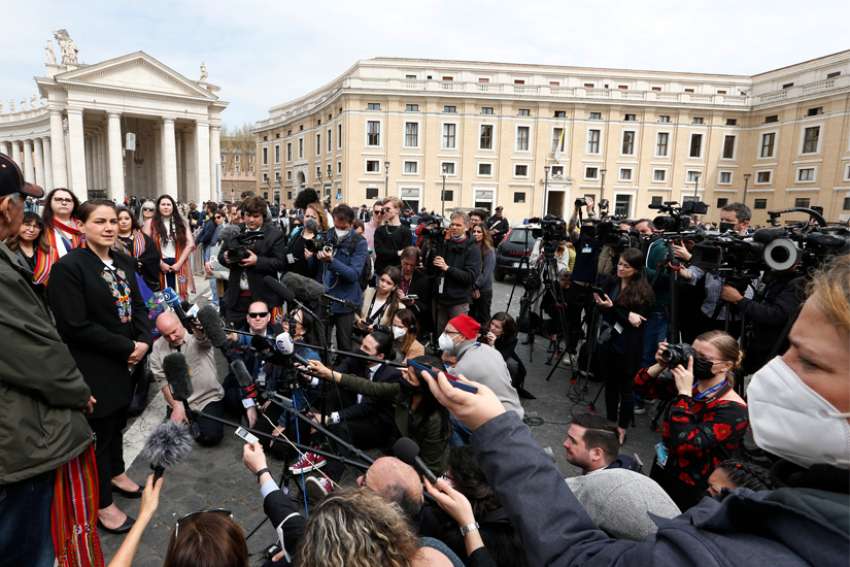VANCOUVER -- The executive director of the Catholic Civil Rights League is urging media to be responsibile in its reporting in the wake of the historic meetings at the Vatican between Pope Francis and representatives of Canada’s First Nations.
Christian Elia noted that anti-Catholic hate speech, vandalism and arson erupted throughout the country last summer, especially in B.C. and the Maritimes, after sensational and inaccurate news coverage surrounding the release of information about unmarked graves at the old Kamloops Residential School.
It is critical, therefore, that the mainstream media report the results of the Indigenous meetings without bias, he said.
But given the anti-Catholic tone he has seen in news coverage leading up to the Vatican meetings, Elia isn’t optimistic. “I heard some good, old-fashioned, general run-of-the-mill, anti-Catholic statements in the media in the last couple of weeks,” including “some political commentary that has kind of made me wince.”
The Catholic Civil Rights League launched a nationwide database last November to keep track of attacks on church property and personnel. It identified 153 incidents since 2010 and has since added three more. Twenty-five incidents involved arson, and a further 50 described property damage and graffiti.
In B.C., several individuals were charged following church attacks last summer.
Kathleen Panek pleaded guilty in October to two counts of arson in connection with the July 2021 destruction of St. George’s Coptic Orthodox Church in Surrey. She was to be sentenced April 8.
Suspects in another church attack also pleaded guilty to charges of mischief under $5,000 after smearing orange paint on the front of St. Jude’s Parish church in Vancouver last Canada Day.
Zoe Luba received a conditional discharge and 12 months probation on Dec. 7 and was ordered to pay a $100 victim-fine surcharge. Her sister, Emily Luba, also received a discharge conditional upon her completing 12 months’ probation. She was also ordered to pay a victim fine surcharge of $750, stay away from the parish property, write a letter of apology to the pastor and congregation, and complete 40 hours of community work service.
Statistics Canada reported March 17 that police-reported hate crimes rose 37 per cent from 2019 to 2020, to a total of 2,669 incidents. Crimes motivated by hatred of religion decreased by 16 per cent to 515. Those targeting Jews accounted for most, rising to 321 incidents from 306 in 2019. Anti-Muslim crime dropped (82 incidents compared with 182 the year before) as did anti-Catholic hate crime (42 compared with 51).
Elia said the league’s database clearly shows a large increase in anti-Catholic hate crimes throughout the summer of 2021.
Statistics Canada cited the effects of the COVID pandemic for the overall rise in hate crimes. That trend was also cited by the B.C. Human Rights Commission when it announced last August that it would hold an official inquiry into “the disturbing surge of hate [during] the pandemic.” The commission said in a February news release that it had received online submissions from more than 1,700 persons who said they had either witnessed or directly experienced a hate incident during the pandemic. The window for public input closed March 6.
Elia said Catholics have a civic responsibility to ensure authorities know of church attacks, even if it’s as minor as graffiti. “If incidents aren’t reported and if the perpetrators of incidents aren’t sought after by local authorities, we cannot take any (action),” he said.
Church attacks can be reported at ccrl.ca/report-an-attack-at-a-church-or-religious-site.


